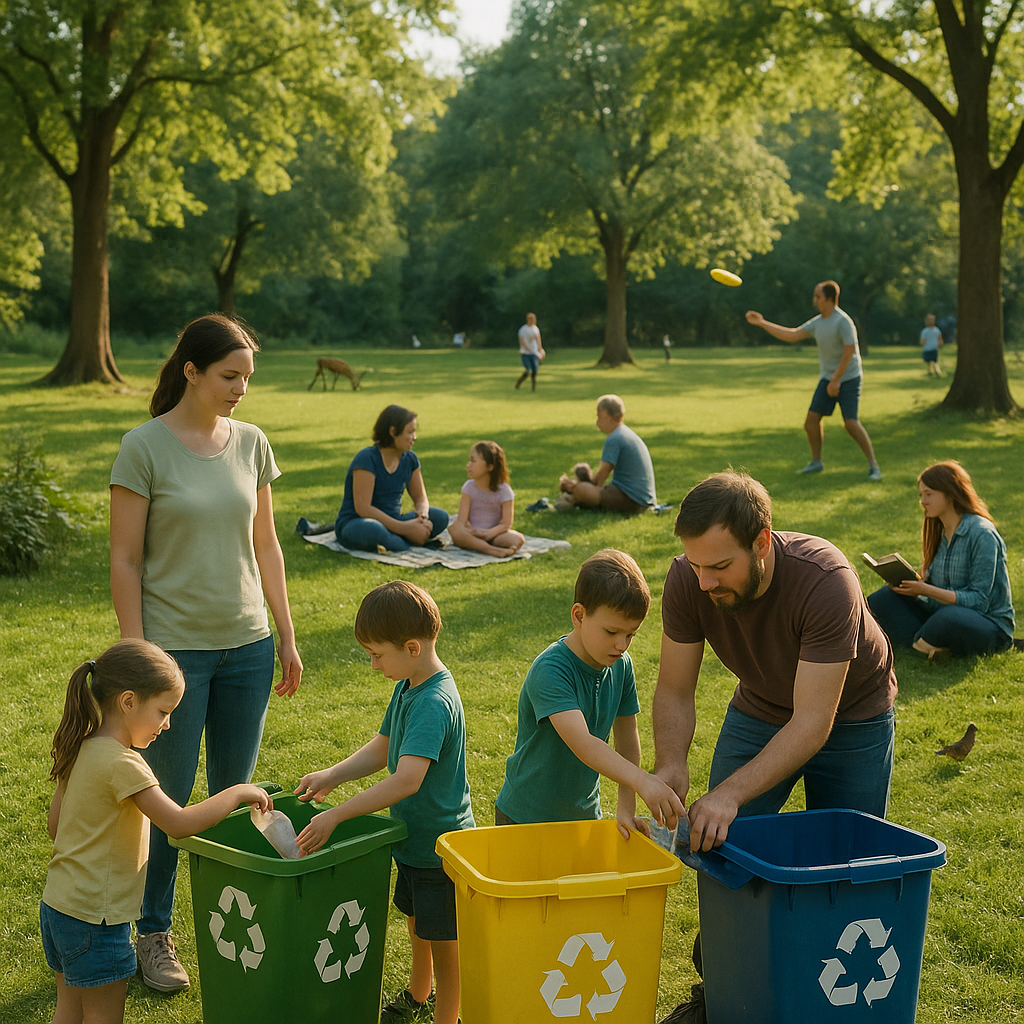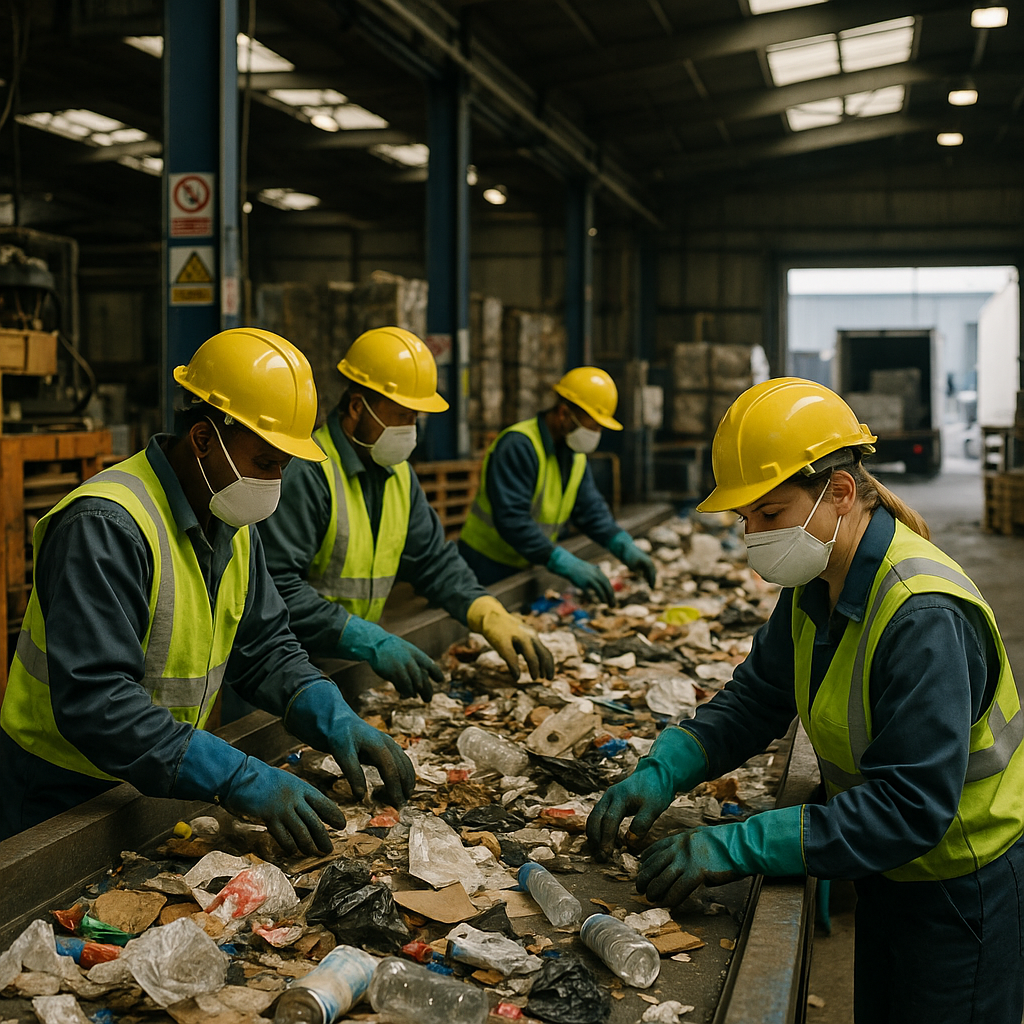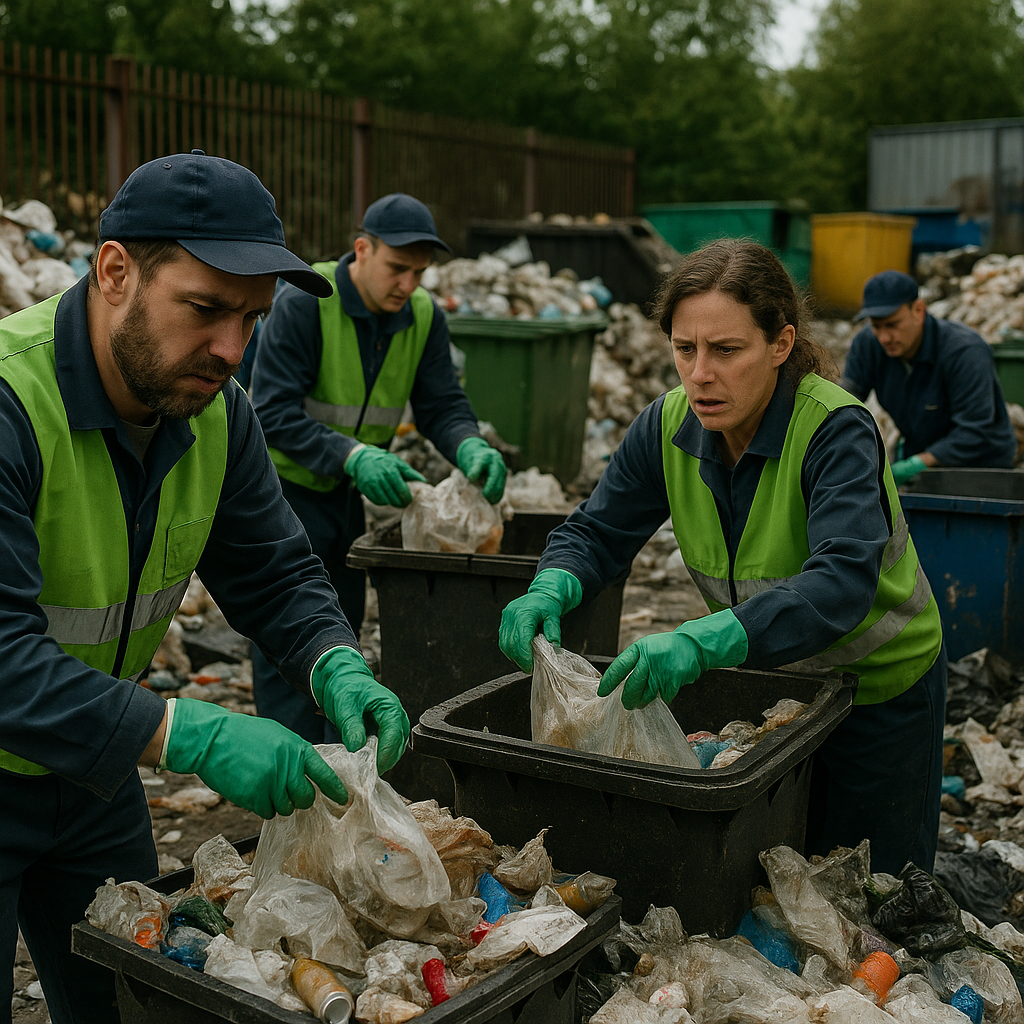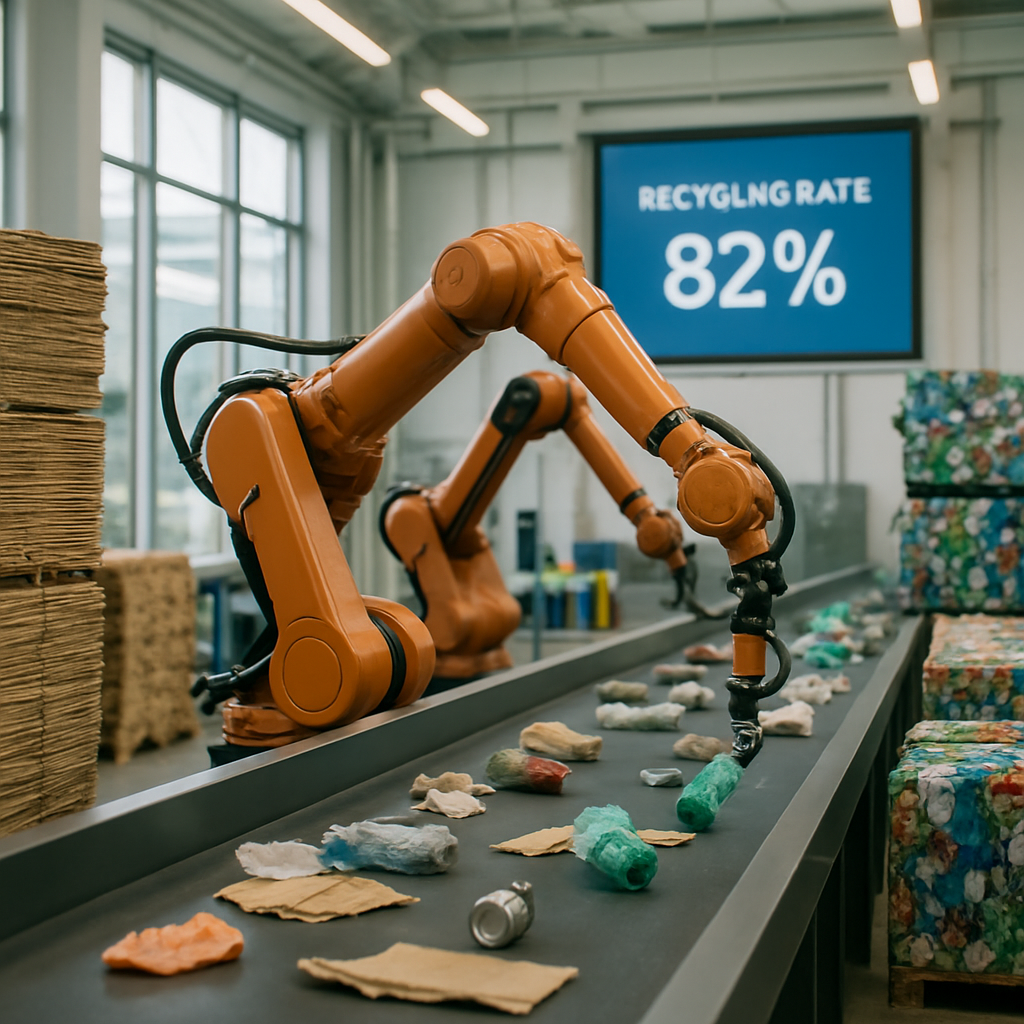5901 Botham Jean Blvd, Dallas, TX 75215
What is the Recycling Industry? How It Works, Benefits, and Future Trends
August 27, 2025Every day, millions of tons of materials are discarded as trash worldwide. The recycling industry transforms this potential waste into valuable resources. It is a network of businesses and processes dedicated to collecting, sorting, processing, and converting used materials into new products.
The recycling industry serves as an essential environmental safeguard. It diverts materials from landfills and incinerators, preserving natural resources that might otherwise be depleted through mining, logging, and extraction. Each recycled aluminum can or paper product results in fewer trees being cut and less bauxite mined.
The industry consists of various key players working together. Collection services gather recyclables from homes, businesses, and public spaces. Sorting facilities use advanced technology to separate materials by type. Processors then clean and convert these materials into usable forms. Finally, manufacturers incorporate these recycled materials into new products, completing the circular economy cycle.
What are the Environmental Benefits of Recycling?

Recycling transforms materials that would otherwise end up in landfills into valuable resources. This process offers significant environmental benefits, from preserving natural habitats to reducing our carbon footprint.
Resource Conservation
Recycling primarily benefits resource conservation. By reusing materials, we reduce the need to extract, refine, and process new raw materials from the Earth. This preservation is crucial since many resources are limited.
The impact is significant across various materials. Paper recycling saves trees, water, and energy. Recycling metals eliminates the need for environmentally harmful mining operations. Plastic recycling decreases petroleum consumption, a non-renewable resource that takes millions of years to form.
Energy Savings
Manufacturing products from recycled materials generally uses significantly less energy than creating them from new materials. These energy savings lead to reduced fossil fuel consumption and lower air pollution levels.
The numbers illustrate this clearly. Recycling aluminum cans saves 95% of the energy required to produce aluminum from bauxite ore. Steel recycling saves 60% of production energy. Paper recycling saves 40% of the energy needed when using virgin wood pulp.
In 2014, the United States saved over 322,000 gigawatt-hours of energy through recycling and composting of municipal solid waste. This could power about 30 million American homes for a year.
Greenhouse Gas Reduction
Recycling is crucial in combating climate change by reducing greenhouse gas emissions. It lowers methane emissions from landfills, reduces industrial energy use, and helps preserve forests that absorb carbon dioxide.
According to EPA data, recycling and composting of municipal solid waste in 2018 saved over 193 million metric tons of carbon dioxide equivalent. This reduction is equivalent to the emissions from more than 41 million passenger vehicles driven for a year.
Using scrap steel instead of virgin ore reduces water usage by 40% and generates 97% less mining waste. Recycling one ton of paper saves enough energy to power the average American home for six months while conserving 7,000 gallons of water and 3.3 cubic yards of landfill space.
Environmental Protection
Beyond resource and energy savings, recycling helps protect ecosystems and wildlife habitats. By reducing the need for raw material extraction, we minimize disruption to natural areas and decrease pollution from mining and harvesting.
Recycling also addresses the growing issue of waste in our oceans and waterways. Plastic recycling, in particular, helps prevent harmful debris accumulation that threatens marine life and ecosystems.
The environmental benefits of recycling increase when adopted widely. As recycling technology advances and more materials become recyclable, the positive impact on our planet will continue to grow.
How Does Recycling Benefit the Economy?

The recycling industry serves as a significant economic engine across the United States. According to the EPA’s 2020 Recycling Economic Information Report, recycling and reuse activities generate 681,000 jobs nationwide, spanning sectors such as collection, sorting, processing, and manufacturing.
Beyond employment numbers, the financial impact is substantial. The same EPA study revealed that recycling contributes $37.8 billion in wages to American workers, translating to approximately $65,230 in wages for every 1,000 tons of materials recycled. Additionally, recycling operations generate $5.5 billion in tax revenue, bolstering local and state economies.
Ferrous metals recycling leads in economic contribution, followed closely by the construction and demolition (C&D) sector, with non-ferrous metals like aluminum completing the top three economic contributors.
Processing recyclable materials creates significantly more jobs than traditional waste disposal. For every 10,000 tons of waste, recycling creates 36 jobs compared to just one through incineration. This 36-to-1 ratio underscores recycling’s superior capacity for employment generation.
Businesses benefit directly from recycling through reduced production costs. Manufacturing with recycled materials typically requires less energy than using virgin resources. For example, recycled aluminum production uses 95% less energy than manufacturing from raw bauxite ore, translating to lower operational costs for manufacturers.
The recycling industry also stimulates market expansion through innovation. With abundant recycled materials available, product developers gain flexibility to create new goods or replace standard materials with recycled alternatives. This cross-industry innovation drives growth in markets for reused products.
Local economies particularly benefit from recycling initiatives. Investing in recycling infrastructure creates jobs that cannot be outsourced, as collection services, sorting facilities, and processing centers must operate within the communities they serve, enhancing regional financial stability.
For municipalities seeking sustainable waste solutions, recycling offers a triple benefit. It diverts materials from landfills, creates local jobs, and generates revenue through the sale of recovered materials. This combination of environmental and economic advantages makes recycling a cornerstone of sustainable community development.
| Material Type | Job Creation (per 10,000 tons) | Energy Savings (%) |
|---|---|---|
| Ferrous Metals | 36 | ~60-74% |
| Nonferrous Metals (e.g., Aluminum) | ~95% | |
| Plastics | ~70% | |
| Paper | ~40% | |
| Glass | ~40% |
What Challenges Does the Recycling Industry Face?

The recycling industry operates at the intersection of environmental stewardship and economic viability. While recycling offers significant environmental benefits, several critical challenges hinder its effectiveness and growth. Understanding these obstacles is essential for developing practical solutions to strengthen recycling systems.
Consumer Confusion and Education Gaps
One of the most persistent challenges in recycling is widespread confusion about what materials can be recycled. Many consumers wish to recycle but lack a clear understanding of proper sorting practices. This confusion leads to costly errors in the recycling stream.
Studies reveal that items accepted in some areas but not others have disposal error rates as high as 52%. This inconsistency across regions creates a confusing landscape for consumers who travel between areas with different recycling guidelines.
The phenomenon of “wish-cycling” compounds this problem. Well-meaning individuals place non-recyclable items in recycling bins, hoping they can be processed, unaware that this contamination can render entire loads unusable.
Contamination in Recycling Streams
Contamination is one of the costliest challenges for recycling facilities. When non-recyclable materials enter the recycling stream, they can damage sorting equipment, reduce the quality of recyclable materials, and significantly increase processing costs.
Material recovery facilities spend at least $300 million annually on additional labor, excess processing, and equipment repairs due to contamination. These costs ultimately make recycling less economically viable and can force facilities to reject entire truckloads of materials, sending potentially recyclable items to landfills.
The cost of collecting contaminated recyclables can reach up to $766 per ton in some areas, compared to $126 per ton for regular waste collection. This substantial cost difference highlights the financial burden contamination places on recycling programs.
Market Volatility and Economic Challenges
The market for recycled materials experiences significant price fluctuations, creating economic uncertainty for recycling operations. When virgin material prices drop, particularly during periods of low oil prices, recycled materials become less competitive alternatives.
During the COVID-19 pandemic, decreased oil prices made virgin plastics cheaper than recycled plastic, significantly reducing demand for recycled content. This market volatility makes long-term planning difficult for recycling businesses and municipalities.
Supply chain shortages and increasing regulatory pressure for sustainable materials are gradually improving market conditions, with manufacturers showing renewed interest in incorporating recycled content into their products.
International Policy Changes
Global policy shifts have fundamentally changed recycling markets. In 2018, China implemented its National Sword policy, severely restricting imports of recyclable materials. Prior to this policy, China handled nearly half of the world’s recycling waste, accepting approximately 31% of all U.S. scrap materials.
China’s new standards permit only 0.5% contamination in plastic bales, 1% in metals, and 1.5% in paper scrap. These standards are dramatically more stringent than the typical 25% contamination rate in U.S. recycling streams, effectively closing this major export market for American recyclables.
When these international markets closed, many U.S. municipalities and recycling companies struggled to find alternative buyers for collected materials, forcing some communities to scale back or temporarily suspend recycling programs.
Infrastructure and Investment Limitations
Many recycling facilities operate with outdated technology and infrastructure, limiting their capacity to process materials efficiently. Inadequate funding for modernization hampers the industry’s ability to adapt to changing material streams and market demands.
Without sufficient investment in advanced sorting technologies, automated processing systems, and capacity expansion, recycling facilities cannot achieve the scale and efficiency needed to be economically sustainable. Smaller communities particularly struggle to provide comprehensive recycling services due to infrastructure costs.
The lack of advancement in recycling processes contributes to environmental degradation as potentially recyclable materials end up in landfills or incinerators instead of being processed into new products.
Worker Safety Concerns
Workers in recycling facilities face significant occupational hazards, including exposure to hazardous materials, risk of injury from sorting machinery, respiratory issues from dust and small particles, and injuries from improperly discarded sharp objects.
The handling of e-waste presents particular concerns, as discarded electronics can contain toxic substances like lead, mercury, and cadmium. Without proper safety protocols and equipment, workers face serious health risks that can deter qualified individuals from entering the industry.
Despite these challenges, the recycling industry continues to evolve and adapt. Technological innovations, improved education efforts, and growing demand for sustainable products are creating new opportunities to overcome these obstacles and build more resilient recycling systems. The development of domestic markets for recycled materials and investment in advanced processing technologies will be crucial for the industry’s long-term success.
What is the Future of the Recycling Industry?

The recycling industry is on the cusp of significant change. Today’s waste management challenges require innovation beyond traditional methods. Advanced technologies, particularly artificial intelligence and robotics, are transforming how materials are sorted and processed. These smart systems can identify and separate different types of waste with remarkable precision, greatly enhancing recycling efficiency and minimizing contamination.
Circular economy principles are gaining global traction as businesses and governments see their environmental and economic benefits. This model emphasizes keeping materials in use as long as possible through reuse, refurbishment, and recycling. Transitioning from the traditional linear “take-make-dispose” approach to circular systems represents a fundamental change in how we perceive resources and waste.
Innovative recycling processes for complex materials show particular promise. E-waste, textiles, and multi-layer packaging, once major recycling challenges, are now more manageable through chemical recycling and other advanced technologies. These advancements help recover valuable materials that might otherwise end up in landfills.
There is also an increasing focus on designing products for recyclability from the outset. Companies are rethinking product design to ease disassembly and material recovery. This upfront approach addresses recycling challenges before they arise and is essential for creating sustainable product lifecycles.
Government initiatives and policies worldwide are fostering these positive changes. Regulatory frameworks like extended producer responsibility and recycling targets create essential conditions for industry innovation while raising public awareness about proper recycling practices.
The future of recycling appears promising as these developments merge to form more efficient, effective systems. For businesses and municipalities seeking expertise in implementing sustainable waste management solutions, contact Okon Recycling at 214-717-4083.
